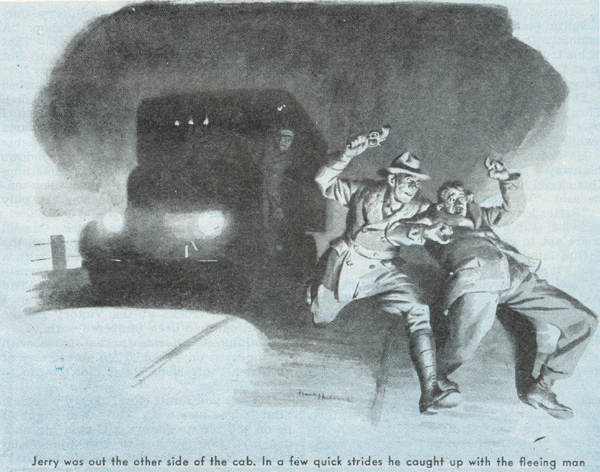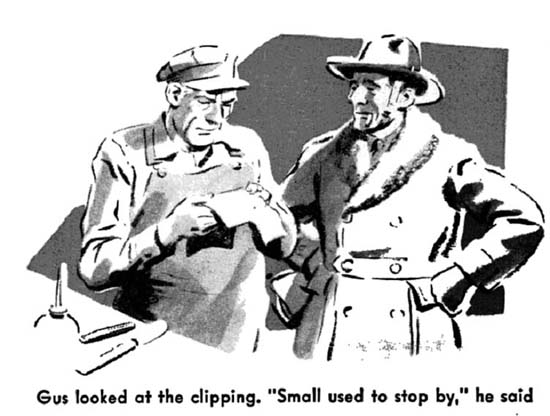February 1945
GUS BEATS MURDER TO THE PUNCH
by Martin Bunn

State Trooper Jerry Corcoran, his boots mirror-like as usual, his sheepskin coat buttoned against winter winds, and his wide-brimmed hat at its habitual devil-may-care angle, regarded his friend Gus Wilson with the haggard eyes of a weary and worried man.
"What's the matter with you?" Gus demanded. "You look as gloomy as a funeral."
"I'm gloomy because I'm trying to prevent a funeral -- and I'm not making such a hot job of it," Jerry answered. He took some papers from his pocket and passed one over. "Remember that?" he asked.
Gus looked at the newspaper clipping and nodded. "Poor Hank Small," he said. "Used to stop by when he had a taxi -- before he started driving a truck for the Victory plant. Went to sleep and ran off the road."
"Broke his neck," Jerry agreed grimly. He handed Gus another clipping.
"I remember this one, too," Gus said. "Same kind of accident. I didn't know Sam Schwartz."
Jerry lit a cigarette. "Do you see anything queer about those two wrecks?"
Gus shook his head. "Why no," he said, "unless it is that both drivers worked for the same concern and were killed in accidents of the same sort within a few weeks of each other. Hard luck runs in streaks."
"Yes," Jerry assented. "We figured it was just a hard-luck streak, too." He handed Gus a folded sheet of paper. "But not after about a week ago when every driver who works for the Victory outfit got one of these."
Gus unfolded the paper. It was a ruled sheet torn from a cheap pad, and on it was a single line of penciled printing that read:
IT WILL GET YOU TOO
Gus whistled softly.
"We haven't any proof," Jerry said, "but we're pretty sure we know the guy who printed that.
He's one of the drivers -- calls himself William J. Smith. There's nothing against him except that before Pearl Harbor his name was something else and he belonged to the Bund. But last night they had another wreck of the same sort. Fortunately it wasn't fatal. You know Fred Gaskell?"
"He belongs to my bowling club," Gus said. "He's been working in the Victory plant ever since it opened, but he doesn't drive a truck. He's in charge of their fleet."
"Last night he drove one," Jerry told him.
"Took the place of a fellow who lost his nerve when he found one of those warnings in his overall pocket. The Victory people have to make deliveries to a plant out of the State seven nights a week -- they make parts for something the Army needs quick. That's why the G-men are interested.
"Gaskell wasn't badly hurt, and his truck was only partly wrecked," Jerry explained.
"It's being towed here. We want you to go over it before anyone else does, O.K.?"
"Of course," Gus agreed. "I'll help if I can . . . Those other two accidents were investigated, weren't they?"
"Yes," Jerry said. "But Small was killed instantly, and Schwartz didn't regain consciousness, so neither could say anything."
Gus handed back the clippings and the penciled warning. "What was the date of the first wreck?" he asked.
"January 7th," Jerry told him. "The second was on the 29th." He wound his muffler around his neck. "You're lucky, working in a warm place. Believe me, riding a motorcycle last night was a cruel job. I'll escort the wrecker in."
Gus stared unseeingly at the shop door after it had closed behind Jerry. "It was cold last night," he said musingly. "It could be that . . . worth checking, anyway."
He went into the office and called Dr. Marvin. "Doc," he asked, "are you still playing with weather forecasting?"
Doc laughed. "I still keep an eye on it. Why?"
"Which night was the coldest so far this winter?" Gus asked.
"That's easy," Doc told him. "January 29th -- five below zero at midnight."
"How about that night toward the beginning of the month?" Gus persisted.
"It was cold then, too," Doc assented.
"Oh January 7th it was one above -- just a little colder than it was last night."
"Thanks," Gus said. "How cold is it going to get tonight?"
"I'll bet you a real good cigar," Doc said, "that it's below zero by midnight."
Early that afternoon Jerry Corcoran came into the Model Garage shop with a man who had one arm in a sling and his face decorated with bandages and surgical tape.
"Hard luck, Fred," Gus said consolingly.
"It's nothing serious, I hope."
Gaskell grinned crookedly. "Nothing I won't get over. Lucky it wasn't my bowling arm."
"How did it happen?" Gus asked.
"According to all the evidence, I went to sleep at a curve," Gaskell admitted sheepishly. "It was so cold I had the windows closed, and I remember feeling drowsy and thinking that I ought to open one. The next thing I remember the truck was in a ditch."
"Truck outside?" Gus asked. "I'll look at it. Make yourself comfortable, Fred."
Gus examined the front end carefully.
Then he got into the cab. After a minute he climbed out, raised the hood, and examined the engine briefly.
Back in the shop he faced Jerry and Gaskell. "I've found out how your trucks were wrecked," he said. "But that's only part of the job. We want to catch the man who murdered Small and Schwartz -- catch him red-handed, and send him where he can't do any more damage. We can do that tonight, if you two will help."
"It's O.K. with me," Gaskell said.
"I'm taking your orders," Jerry assented.
"Good!" Gus said. "Now, Fred, when are your trucks serviced, and when do they leave on their night trip?"
"They're serviced in the afternoon," Gaskell told him, "and they leave as soon as they're loaded -- about seven o'clock. The drivers don't try to keep together. There'll be six tonight."
"Good enough," Gus said. "Fix it so I can go over them for 10 minutes while no one else is in your garage."
One of the plant guards was waiting for Gus and Jerry when they came to a stop at the gate of the Victory Manufacturing Company. "I'll take you to the garage, Mr. Wilson," he reported.
"Thanks," Gus told him. He turned to Jerry. "Hook yourself onto Smith when he comes out, and when he changes trucks get in with him."
Jerry nodded. Gus followed the guard to the garage and left him at the door. He lifted the hood of each truck examined the engine quickly, and made some notes.
The trucks were loaded in a courtyard. Gus swung his arms and stamped his feet through a frigid 10 minutes. Then Gaskell and Jerry appeared with a group of drivers who looked worried. "Get your trucks and load up," Gaskell told them.
They went off toward the garage. Jerry was following a short, thin, middle-aged man with a sullen face. "That's Smith," Gaskell pointed out. "He drives No. 4."
Gus consulted his notes. "After they all have backed to the loading platform," he ordered, "tell Smith to change to No. 2."
Gaskell nodded. He walked down the line as the trucks were backed to the platform and swiftly filled with heavy cases. "Smith!" he called. "Take Bill Henty's truck tonight . . . Henty! Drive Smith's."
Smith seemed about to protest, but he evidently thought better of it. He got out of his truck and into Henty's. Jerry climbed in at the opposite side. "You don't mind me riding a way with you, do you?" he asked.
The driver glowered, but he didn't protest.
Then Gus climbed in at the left and crowded behind the wheel. "I'm going to drive awhile," he explained.
He drove out of the yard and down the highway. Both cab windows were open. Gus closed his. "Shut your window, Jerry," he said. "We don't want to catch cold."
"Better leave them part-way open," Smith growled. "It gets stuffy if you don't, and we're apt to get sleepy."
Gus laughed genially. "Why, man," he said, "it's close to zero and getting colder."
They drove on and on. Two hours passed. As they neared a roadside tavern, Smith broke his silence. "Stop for coffee," he demanded. "I've got to have a cup to keep me awake."
But Gus drove on. "You don't need to keep awake," he told him. "I'm driving."
They went on for another hour. Gus's head was aching, and Jerry's stomach wasn't feeling right. Smith, who had slumped forward in his seat, straightened up with an effort. "I gotta have air!" he muttered.
"Open a window. Lemme outta here!"
"Small and Schwartz had to have air, too -- but they didn't get it," Gus said sternly. "What's the matter -- are you afraid?"
He felt the little man start. "Open a window mister," Smith whined. "We'll all be dead if you don't. This cab's full of carbon monoxide!"
"Now you're imagining things," Gus told him. "Where would carbon monoxide come from?"
"The exhaust fumes are coming up through the floor boards," Smith gasped. "The exhaust manifold is loose."
"How do you know that?" Jerry asked.
"I know it because I loosened the nuts," Smith yelled. "Lemme outta here!"
The lids were dropping over Gus's eyes, and the road was weaving crazily in the beam of the headlights. He tried to open his window, but his fingers fumbled helplessly. Then there was a shattering of glass, and cold, fresh air rushed into the cab.
Gus gulped in lungfuls of it, stopped the truck, and swung out onto the running board. Jerry had his revolver in his hand -- he had smashed the window with its butt.
Smith straightened up, and made a dive past Gus through the open door. Jerry was out of his side in a flash, his clubbed revolver still in his hand. He caught Smith in a few quick strides, and hauled him back.
The next afternoon Trooper Jerry Corcoran came jauntily into Gus's shop. "A full, signed confession," he reported. "That Nazi is where he'll do no more harm. But say, how did you figure it out anyway?"
"You gave me the idea when you grouched about how cold it was the night Gaskell had his wreck," Gus laughed. "When I checked I found that Small and Schwartz had also run off the road on cold nights when they probably had their windows closed. That made it likely that something had put them to sleep or made them unconscious. Carbon monoxide was the only thing I could think of that would do it.
"When I examined the truck Gaskell ditched. I saw that some of the nuts on the exhaust manifold had been loosened with a wrench -- there were fresh marks on them -- and that the floor boards of the cab had obviously been loosened. Then when I checked the trucks at the Victory garage I found one had been tampered with.
"Making Smith ride in that truck with us," he went on, "seemed the surest way of getting a confession. But I didn't mean to run it so close."
"I'll say you ran it close!" Jerry whistled. "But it was nice work, Gus. You ought to be on the force. There's a G-man big shot due in a few minutes to give official thanks. You'd better put on a clean shirt!"
END
L. Osbone 2019
